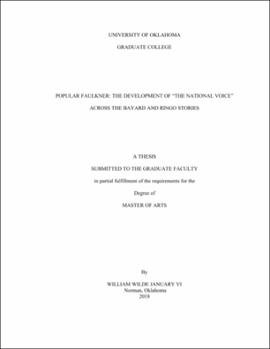| dc.contributor.advisor | Zeigler, James | |
| dc.contributor.author | January, William | |
| dc.date.accessioned | 2018-05-10T18:52:34Z | |
| dc.date.available | 2018-05-10T18:52:34Z | |
| dc.date.issued | 2018-05-11 | |
| dc.identifier.uri | https://hdl.handle.net/11244/299840 | |
| dc.description.abstract | This thesis seeks to demonstrate the development of a 'popular' Faulkner that emerges through the composition history of his 1938 novel 'The Unvanquished.' Using Michael Warner's concept of "publics," Faulkner's Bayard-Ringo stories, in their writing and rewriting for George Horace Lorimer and 'The Saturday Evening Post,' can be read as the first Yoknapatawpha county stories to demonstrate a heightened contemporary political relevancy by allegorizing and criticizing Franklin D. Roosevelt's New Deal. Examining the steps taken to transform the magazine stories into a much longer, proper novel, we can see 'The Unvanquished' not as a derivative work hastily composed for profit, but a key bridge between the insular high-modernist novels of Faulkner's early career and the more politically direct novels that appear after the Second World War. | en_US |
| dc.language | en_US | en_US |
| dc.subject | William Faulkner | en_US |
| dc.subject | The Unvanquished | en_US |
| dc.subject | The Saturday Evening Post | en_US |
| dc.subject | Short Stories | en_US |
| dc.title | Popular Faulkner: The Development of “The National Voice” Across The Bayard and Ringo Stories | en_US |
| dc.contributor.committeeMember | Garofalo, Daniela | |
| dc.contributor.committeeMember | McDonald, William | |
| dc.date.manuscript | 2018-05 | |
| dc.thesis.degree | Master of Arts | en_US |
| ou.group | College of Arts and Sciences::Department of English | en_US |
